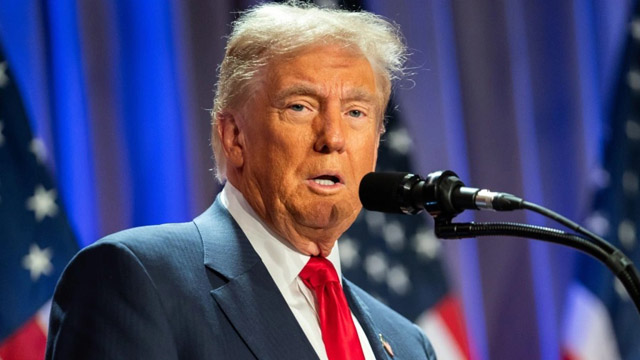
PARIS, Nov 27, 2024 (BSS/AFP) - The coming year will put incoming US
President Donald Trump's geopolitical strategies to the test, as wars rage in
the Middle East and Ukraine and tensions rise in Asia.
Here are some of the big foreign policy hot spots facing him and other world
leaders in 2025.
- Middle East -
More than a year on from the Hamas attacks of October 7, 2023, the Middle
East risks tipping into regional conflict.
Israel is pursuing its deadly retaliatory offensive in Gaza while also
battling another militant group, Iran-backed Hezbollah, in Lebanon.
Trump has nominated a staunch pro-Israel politician, Mike Huckabee, as his
ambassador to Israel.
Michael Horowitz, an analyst at consultancy Le Beck International, said Trump
has pledged to "end wars" but does not look inclined to set conditions for
Israel.
"The conflict in Gaza could really enter a state of limbo, with Israel
imposing a new military solution that keeps troops inside the Strip and
declaring that the conflict has ended -- without even the beginning of a
political solution," he told AFP.
Horowitz judged a ceasefire in Lebanon more likely, as Israel has achieved "a
lot of its objectives", having bombarded Hezbollah and killed several of its
leaders.
- Ukraine -
Ukraine is struggling to fight off the invasion launched by Russia in
February 2022.
Kyiv is short of soldiers and depends on Western military aid, while Russia
is advancing in Ukraine's east and has been bolstered by troops from its ally
North Korea.
The Republicans' election victory has raised the prospect of a halt to US
military aid to Ukraine, after party representatives held up a package for
nearly a year.
Moscow is pushing for Kyiv to negotiate a settlement.
Ukrainian President Volodymyr Zelensky said on November 16 that Kyiv would
like to end the war next year through "diplomatic means".
But Russia has demanded Kyiv surrender four regions as a precondition for
talks, which Ukraine has rejected.
Trump said during his election campaign that he could end the war "in 24
hours".
His nominee for US national security advisor, Mike Waltz, on November 24
called for negotiations.
"We need to restore deterrence, restore peace, and get ahead of this
escalation ladder, rather than responding to it," he said.
- North Korea -
Pyongyang has carried out numerous ballistic missile tests in 2024.
Tensions have risen between it and South Korea.
The North also has strengthened its ties with Moscow.
The two countries signed a mutual defence treaty in June and North Korea sent
10,000 soldiers to aid Moscow's fight against Ukraine.
"In return, North Korea will seek military technology from Moscow --
everything from drone defence systems to ballistic missiles," said Fyodor
Tertiskiy, a senior research fellow with the Carnegie Endowment for
International Peace, a US-based think tank.
"These moves signal that we should be prepared for actions from North Korea
that we haven't seen before."
Andrew Yeo, a senior fellow at the Brookings Institution, another US think
tank, meanwhile pointed to growing tensions between North and South Korea.
Pyongyang recently blew up roads and railways between the two states and
accused the South of sending drones into the North.
If Russia further boosts North Korea militarily, "the United States and its
allies in Europe and Asia will need to prepare for a new phase of greater
instability and possible escalation in northeast Asia," said Yeo.
- Taiwan, China -
Elsewhere in Asia, Taiwan remains a potential flashpoint for global conflict.
China claims the island as part of its territory and has said it would never
rule out taking it by force.
The United States is Taiwan's most important backer and biggest supplier of
weapons, but like most other countries it does not have official diplomatic
relations with the island.
Trump has named China hawk Marco Rubio to be his secretary of state,
heralding tensions with Beijing.
Waltz meanwhile has declared that the United States is in "a Cold War with
the Chinese Communist Party".
He has said the United States must learn from the experience of Ukraine's war
with Russia by backing Taiwan in the face of China.